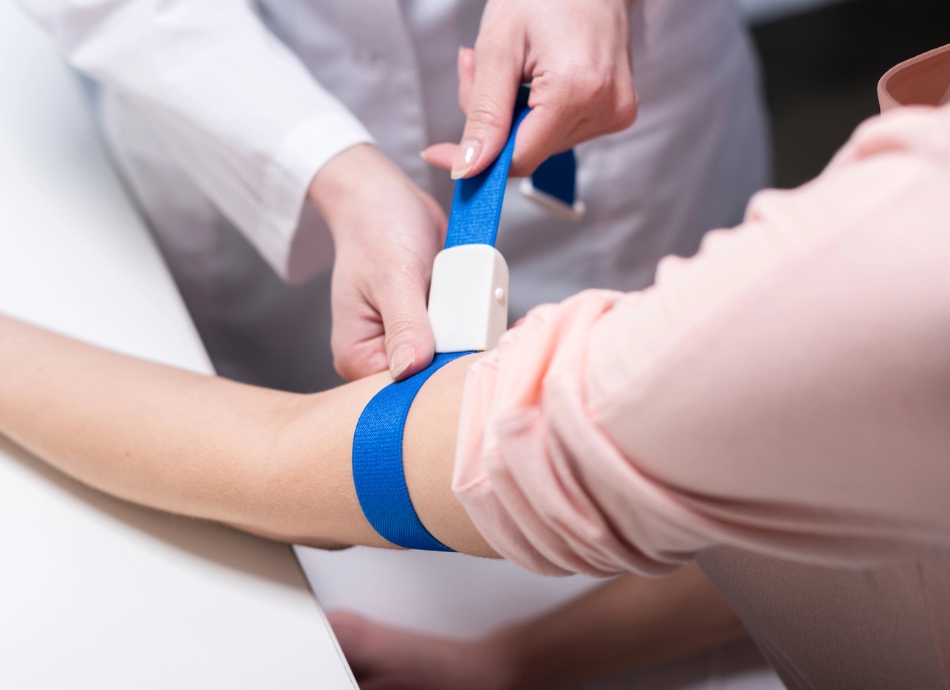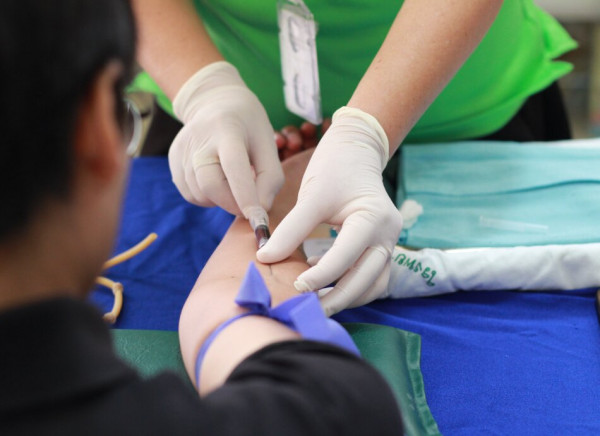Blood tests
Key points about blood tests
- Blood tests are one of the most common types of medical test.
- They have many uses, including assessing your general health, seeing if you have an infection, checking how well your internal organs are working, and screening for certain conditions.
- A blood test involves having a sample of blood taken from a vein in your arm.

A blood test is when a sample of blood is taken from a vein in your arm. This is done by a nurse at your doctor's practice, or in a laboratory by a phlebotomist. A phlebotomist is a medical laboratory technician trained to collect blood and samples from people for testing in a laboratory.
The 2 most common blood tests (especially in hospital) are a full blood count and blood chemistry tests.
- Full blood count – this provides important information about the types and numbers of cells in your blood, including red blood cells, white blood cells and platelets. It's used to check your general health and to help diagnose and monitor a variety of conditions and treatments. Read more about the full blood count.
- Blood chemistry tests – these provide information about your heart, muscles, kidney and other organs. They include checking levels of electrolytes, such as sodium, potassium, calcium, blood glucose, proteins and enzymes in your blood. Examples of blood chemistry tests are kidney function and liver function tests.
Your healthcare provider may need to order blood tests to help diagnose your condition and monitor your progress, or to check whether a treatment is working for you.
Video: Taking a blood sample
Before the test is done, you’ll be asked to identify yourself by stating (and spelling) your name and date of birth. This is done to make sure your results are reported accurately.
After this, a band is put around your upper arm to make the veins below it expand. This makes it easier to draw blood from them. Your arm may feel tight for the short time the band is in place.
The injection site is then cleaned with an alcohol swab.
You may feel a brief sting or a prick as the needle is inserted into your vein. A tube will be attached to the needle for the blood to be collected in. Depending on how many blood tests you’re having, more than one tube of blood may need to be collected while the needle is in place.

Image credit: Canva
Some people feel nervous about having a blood test. However, the person taking your blood sample is trained in this procedure and it’s usually straightforward.
If you feel squeamish or nervous, it can be better not to watch while your blood is being taken. If you feel faint or lightheaded before, during or after the blood test, tell the nurse or phlebotomist. There should be the option for you to lie down during the test.
If you’ve had this sort of reaction in the past, or if you have any other concerns, tell the person taking the blood sample before they start.
Video: Scared of needles? Here’s how to stay calm during a blood test
(Nuffield Health, UK, 2019)
Apps reviewed by Healthify
You may find it useful to look at the oVRcome app, which is an app for people who have a phobia or fear, including fear of needles, and want to overcome it.
After the blood sample is taken, a cotton swab is put on the site where the needle went in. You may be told to hold the swab and apply pressure there for at least 3 minutes. This will stop any bleeding. It also reduces the chance of a bruise developing. A plaster is applied, which can be removed after about half an hour.
After your blood test, wait for at least an hour before using your arm for any heavy lifting or anything else that uses a lot of effort.
If you had your blood test done in a lab in the community, the results will be sent to the healthcare provider who ordered the test, and they will tell you if any follow-up is needed. If your general practice has a patient portal, you may be able to view your results there once they’ve been signed off.
Some people develop a bruise at the injection site. Any small bruise should fade after a few days.
Less often, there may be bleeding or a lump (called a haematoma) may develop at the injection site. If this happens, cover the area with a clean cotton swab or tissue and apply firm pressure to the area for 10 to 15 minutes. A cold pack (eg, ice cubes in a plastic bag or wrapped in a cloth) can also reduce swelling.
The injection site may be slightly sore and a bigger bruise may develop from a haematoma. The bruise can take up to 10 days to go away, but there are no long-term side effects from this.
If you have any ongoing concerns after the test, contact your healthcare provider.
Should I have more blood tests every day?
If your blood test results have been the same for a few days, you may not need to have tests every day.
Your doctor will advise when a blood test is necessary again, such as when your treatment changes.
When would I need a blood test every day?
You may need to have a blood test every day if:
- you're in an intensive care unit
- your healthcare team isn't sure about your condition
- you're having a new treatment
- you may have internal bleeding.
What are the risks of having too many blood tests?
Blood tests are generally very safe. However, if you have them every day you're at risk of:
- anaemia – a condition in which you have a low red blood cell count
- infection – the risk of getting an infection from a needle being inserted into your vein is low, but the risk can increase as you have more blood tests
- sleep disturbance – in hospital, nurses or phlebotomists (trained medical laboratory technicians who do blood tests) wake you up for a blood test, which can cause poor sleep and affect healing.
Common laboratory tests – a patient's guide(external link) Family Doctor NZ
Blood test safety information(external link) Awanui Labs, NZ
Brochures
Blood tests in hospital – having them every day may not be necessary(external link) Choosing Wisely, NZ, 2015
Apps
References
- Blood tests in hospital – having them every day may not be necessary(external link) Choosing Wisely, NZ, 2016
- Blood test safety information(external link) Awanui Labs, NZ, 2022
- Blood tests(external link) NHS, UK, 2023
Credits: Healthify editorial team. Healthify is brought to you by Health Navigator Charitable Trust.
Reviewed by: Awanui Labs
Last reviewed:





